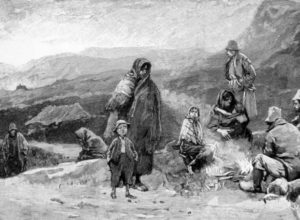
Irish peasants starving during the Potato Famine (1845- 1849), 1846. By Everett Collection @ Shutterstock.com
Rationing, famine, war. Sounds like the 1940s in Europe rather than 2022. Farmers and food producers are warning that energy rationing and food shortages might hit this winter. Andy Bounds and Judith Evan report for the Financial Times:
Farmers and food producers in Europe have warned of seasonal shortages and significant price increases across a wide range of everyday products this winter, as they called for government support to offset surging energy costs.
Copa-Cogeca, the EU farmers’ union, and FoodDrink Europe and PFP, two of the big food producer associations, said their members had already begun to close operations and reduce their output, as they asked for the food chain to be exempt from any European plans to ration energy.
“The latest increases in energy prices, especially natural gas and electricity, threaten the continuity of agri-food production cycles and therefore the ability to continue delivering essential agricultural commodities, food products and feed materials,” they said in a statement ahead of an emergency meeting of EU energy ministers in Brussels.
Energy prices have surged this year due to Vladimir Putin’s war in Ukraine, with Russia reducing gas flows to the continent in retaliation for sanctions. This has sparked fears of energy rationing when demand increases in the colder months.
Pekka Pesonen, secretary-general of Copa-Cogeca, said European shoppers would face even higher prices and shortages of many fruit and vegetables this winter. “It’s something we’ve never seen before,” he said. “Nobody saw this coming and having such wide consequences.”
Energy is used throughout food production from fertiliser to harvesting to refrigeration. The dairy and bakery industries were particularly affected by rising prices, Pesonen explained, because pasteurisation and the process of creating milk powder were energy intensive.
Butter prices in the EU have surged 80 per cent in the year to July, with milk powder up more than 50 per cent and beef 28 per cent higher, according to European Commission data. But farmers say costs are rising ever faster.
Many fruit and vegetable growers are already reducing plantings for the next harvest, with some producers saying the higher cost of operating their greenhouses outweighed the money they could make.
Sweden’s largest tomato grower, Nordic Greens, said it would not plant a winter crop because it could not afford the electricity. Greenhouses in the Netherlands, the world’s second biggest agricultural exporter by value after the US, are also being switching off.
Alexander Formsma, energy specialist at Glastuinbouw Nederland, which represents the sector, said: “You will probably not see lit crops of tomatoes and cucumbers in the winter, because it’s not financially feasible.”
Those growing outdoors were planning to produce less because they could not afford to refrigerate their products and prolong the shelf lives. Belgian apple growers, for example, would have a far shorter season without being able to preserve their fruit.
“We will have greater seasonality with some products not available or very expensive,” Pesonen said.
Read more here.
